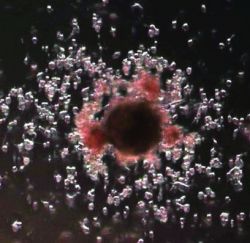Sussex researchers announce pioneering cancer drug project
University of Sussex researchers have found tumour-killing properties in an existing drug commonly used to suppress the immune system - a discovery that could lead to a new treatment for blood cancer.
 Blood cancer: A microscopic image of a leukaemia cell
Blood cancer: A microscopic image of a leukaemia cell
The research team, from the Genome Damage and Stability Centre, has been awarded £146,000 by the blood cancer charity Leukaemia & Lymphoma Research for the pioneering project.
Cyclosporin A (CsA) is an important drug that suppresses immunity in blood cancer patients to prevent the body from rejecting a bone marrow transplant.
Dr Mark O'Driscoll discovered that the drug has some additional unexpected qualities: it can target and kill cancer cells in myeloma (cancer arising from blood plasma cells) and chronic myeloid leukaemia patients.
Dr O'Driscoll, who leads the team, says: "CsA damages the DNA of cancer cells, but as yet we don't completely know how. Our initial research suggests that it only kills cells which have a specific problem in repairing damage to their DNA. We believe that this can be exploited because certain blood cancers possess a very similar DNA repair defect.
"We'll be testing CsA in the laboratory to see exactly how it targets blood cancer cells. With state-of-the-art technology, we can actually visualise the DNA breakage within the cancer cells. If the results are positive, we would hope that CsA can be rapidly made available for patients with these difficult to treat cancers."
Dr David Grant, Scientific Director at Leukaemia & Lymphoma Research, said: "Myeloma, one of the targets for this drug, is currently incurable. CsA could selectively exploit its 'Achilles heel', which is its genetic make-up itself.
"The exciting aspect of this research is that, if it is successful, CsA could be made available for patients on a clinical trial. It has already undergone detailed clinical evaluation and is widely used by the NHS, so we know that it is safe."
